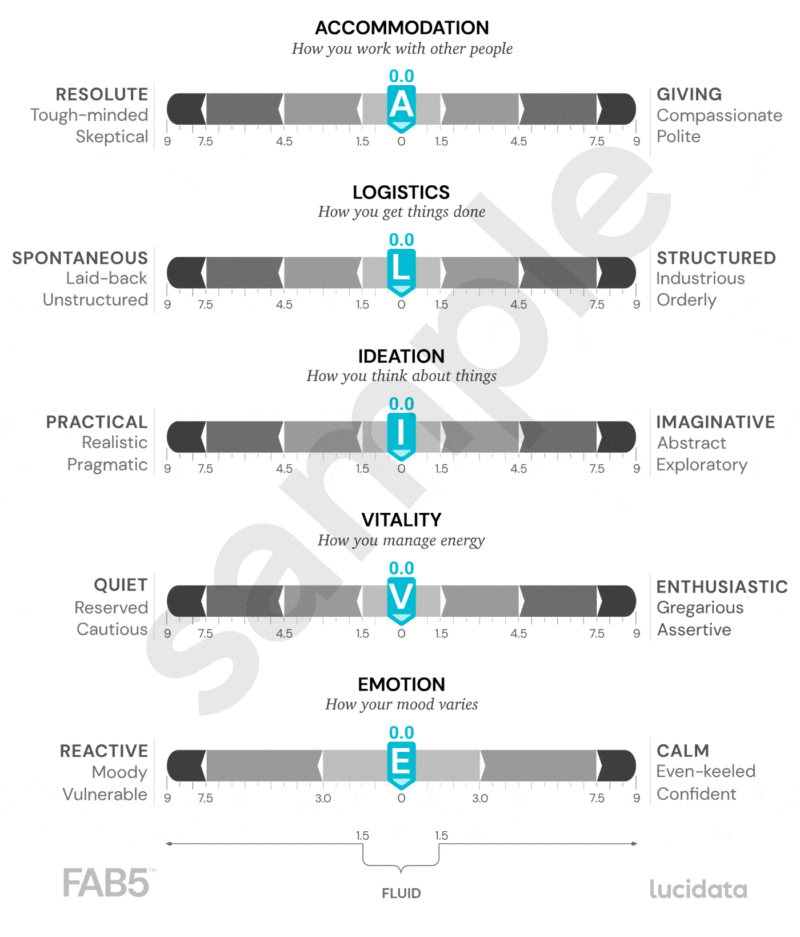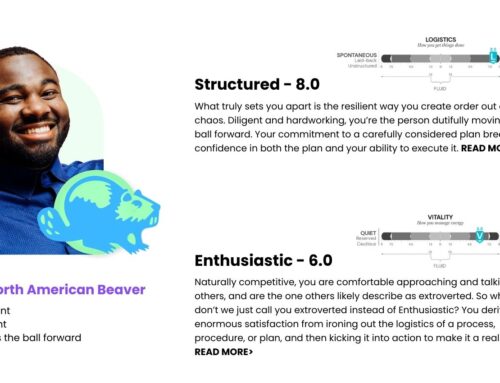Introducing the ALIVE Big 5
Mention ‘personality test’ to most people and you’ll likely hear something like: “I had to take one for….” (e.g. university, a job, etc.). Others may respond: “I took the Myers Briggs something or other. Pretty sure I’m an INTJ.” Pressed to explain what that means, they may add, “I’m an introvert and, uh, I’m not sure about the rest.”
Or, you may be one of those rare individuals to have taken an actual, scientifically validated personality assessment. If so, chances are good you were overwhelmed by great gobs of jargon-choked complexity you wouldn’t be able to explain to others even if you wanted to.
Welcome to the sad state of personality assessments in America, a promising science that has either been overshadowed by the home-brewed Myers-Briggs Type Indicator (MBTI) or one of its many pop psychology offshoots, or made inaccessible by unnecessary insider vernacular and complexities in the form of the NEO-PI, 16pf, Hogan, etc.
In other words, while modern psychological research has created the potential for truly useful, impactful personality assessments, providers have remained wedded to one of the two existing poles: simplistic, non-scientific assessments, or complex, scientific assessments. Where’s the middle ground, the assessment that is both meaningful and easy to use?
Thanks for asking. It’s right here. (Click image to enlarge.)
Traits, Not Types
Even as millions continued to take the MBTI (again using the invalid either-or type-based system), actual researchers in the behavioral and psychological sciences were busy building the case for a traits-based system built on three key indicators: Neuroticism, Extraversion, and Openness. Later, after additional research, two more would be added: Agreeableness and Conscientiousness.
The resulting ‘Big 5’ personality traits, sometimes called OCEAN or CANOE (for the first letter of each trait), are now the agreed-upon standard for a truly accurate representation of an individual’s personality.
InsightFull’s ALIVE Big 5 is an adaptation of the decades of ‘big five’ research, with solid underpinnings of statistically derived clusters of behavioral traits (preferences, tendencies, temperaments) that make up human personality.
Sounds complicated, right? It is.
Which is why we built our system around the science, but simplified its output.
Why We’re Different
There’s no universally accepted ‘big five’ test. That is, there are many versions, most based on science. But we’ve found problems with all of them. Most of the general public has too. That’s what tens of millions have taken them and most come away either overwhelmed and unable to understand the results, or underwhelmed and unable to use the results.
Because our ALIVE Big 5 is intended for all audiences – rather than just scientists, practitioners or industry insiders – we wanted to make it more memorable and user-friendly for everyday users.
First, we reworked the labels to better illustrate the traits they represent.
- Accommodation (vs Agreeableness)
- Logistics (vs Conscientiousness)
- Ideation (vs Openness or Intellect)
- Vitality (vs Introversion-Extroversion)
- Emotion (vs Neuroticism)
More important – way more important, actually – is that we added nuance and measurability to the Big 5 traits-based scoring formulas. So instead of just labeling each trait and pegging someone’s personality relative to it, we’ve named the trait itself AND the two endpoints of each trait – the left and right poles of the trait continuum.
As an example, instead of someone only being identified as ‘low on Accommodation,’ InsightFull refers to them as high on Uncompromising. In this way InsightFull’s ALIVE Big 5 highlights the natural human variability on each trait, and the insights that come from someone’s actual score (ergo ‘InsightFull).
A Personality Assessment Reboot
As we and others have previously noted, the existing family of personality assessments and their reports have done a grave disservice to a discipline that could and should be of invaluable benefit to users (not to mention the companies that employ them, universities that educate them, and so on).
InsightFull’s goal is not merely to upset this existing (dis)order, but to provide a new service that enables anyone and everyone to fully understand their personality and put that knowledge to use reaching goals, overcoming challenges, and building a better world for themselves and those around them. (As we like to say, personality is powerful stuff so use it wisely.)
Specific benefits of InsightFull include:
Validity + Approachability: The ALIVE Big 5 is built on a rock-solid foundation of heavily researched, peer-reviewed, proven items selected by item response theory and published in a highly respected peer reviewed journal.1 But we deliver results in everyday language that anyone can understand and make use of.
Short and Sweet: Rather than spending 30-60 minutes on a lengthy list of often repetitive questions, the ALIVE Big 5 takes, at most, 7 minutes to complete, but with the same results of much longer tests.
Continuous – No more ‘forced choice, either-or’ assessment dichotomies that forcibly put you in one category or the other (e.g. introvert or extrovert). ALIVE uses a six-point scale allowing you to indicate the magnitude of your response to each trait.
Insightful – Simply put, our reports are designed to be useful. We don’t just dump data – or complex interpretative language in your lap. We provide insights that build self-awareness and, by extension, your ability to use that knowledge for your own wants and needs
Accessible Ownership – Every InsightFull report is yours along with the data that goes into it. We are a relationship-based service, meaning you can log in anytime to review an old test, take a new one, or share your information with others.
Affordable – Your Top Personality Trait (TPT) report is free, forever. More comprehensive and targeted reports are at or below the going rate for consumer-oriented personality tests.
Solution-focused – Our reports are designed to be applied to the most common sources of ‘pain’ or struggles people have; we used Google search data for the frequently searched life-enhancing goals relevant to self-development.
Memorable – Time will tell what’s most infectious about our reports, but we believe users will fondly remember their Top Personality Trait (TPT) as well as their associated animal icon and their animal icon (Anicon).
Now we’re in a new era, the Rise of Alive Big Five. And as for all the Myers-Briggs Jungian lunacy out there, let’s make it stop!
——————————————————————————————————————
1 Maples-Keller, J. L., Williamson, R. L., Sleep, C. E., Carter, N. T., Campbell, W. K., & Miller, J. D. (2017). Using Item Response Theory to Develop a 60-Item Representation of the NEO PI-R Using the International Personality Item Pool: Development of the IPIP-NEO-60, Journal of Personality Assessment, 1-12. https://doi.org/10.1080/00223891.2017.1381968.
Introducing the ALIVE Big 5
Mention ‘personality test’ to most people and you’ll likely hear something like: “I had to take one for….” (e.g. university, a job, etc.). Others may respond: “I took the Myers Briggs something or other. Pretty sure I’m an INTJ.” Pressed to explain what that means, they may add, “I’m an introvert and, uh, I’m not sure about the rest.”
Or, you may be one of those rare individuals to have taken an actual, scientifically validated personality assessment. If so, chances are good you were overwhelmed by great gobs of jargon-choked complexity you wouldn’t be able to explain to others even if you wanted to.
Welcome to the sad state of personality assessments in America, a promising science that has either been overshadowed by the home-brewed Myers-Briggs Type Indicator (MBTI) or one of its many pop psychology offshoots, or made inaccessible by unnecessary insider vernacular and complexities in the form of the NEO-PI, 16pf, Hogan, etc.
In other words, while modern psychological research has created the potential for truly useful, impactful personality assessments, providers have remained wedded to one of the two existing poles: simplistic, non-scientific assessments, or complex, scientific assessments. Where’s the middle ground, the assessment that is both meaningful and easy to use?
Thanks for asking. It’s right here. (Click image to enlarge.)
Traits, Not Types
Even as millions continued to take the MBTI (again using the invalid either-or type-based system), actual researchers in the behavioral and psychological sciences were busy building the case for a traits-based system built on three key indicators: Neuroticism, Extraversion, and Openness. Later, after additional research, two more would be added: Agreeableness and Conscientiousness.
The resulting ‘Big 5’ personality traits, sometimes called OCEAN or CANOE (for the first letter of each trait), are now the agreed-upon standard for a truly accurate representation of an individual’s personality.
InsightFull’s ALIVE Big 5 is an adaptation of the decades of ‘big five’ research, with solid underpinnings of statistically derived clusters of behavioral traits (preferences, tendencies, temperaments) that make up human personality.
Sounds complicated, right? It is.
Which is why we built our system around the science, but simplified its output.
Why We’re Different
There’s no universally accepted ‘big five’ test. That is, there are many versions, most based on science. But we’ve found problems with all of them. Most of the general public has too. That’s what tens of millions have taken them and most come away either overwhelmed and unable to understand the results, or underwhelmed and unable to use the results.
Because our ALIVE Big 5 is intended for all audiences – rather than just scientists, practitioners or industry insiders – we wanted to make it more memorable and user-friendly for everyday users.
First, we reworked the labels to better illustrate the traits they represent.
- Accommodation (vs Agreeableness)
- Logistics (vs Conscientiousness)
- Ideation (vs Openness or Intellect)
- Vitality (vs Introversion-Extroversion)
- Emotion (vs Neuroticism)
More important – way more important, actually – is that we added nuance and measurability to the Big 5 traits-based scoring formulas. So instead of just labeling each trait and pegging someone’s personality relative to it, we’ve named the trait itself AND the two endpoints of each trait – the left and right poles of the trait continuum.
As an example, instead of someone only being identified as ‘low on Accommodation,’ InsightFull refers to them as high on Uncompromising. In this way InsightFull’s ALIVE Big 5 highlights the natural human variability on each trait, and the insights that come from someone’s actual score (ergo ‘InsightFull).
A Personality Assessment Reboot
As we and others have previously noted, the existing family of personality assessments and their reports have done a grave disservice to a discipline that could and should be of invaluable benefit to users (not to mention the companies that employ them, universities that educate them, and so on).
InsightFull’s goal is not merely to upset this existing (dis)order, but to provide a new service that enables anyone and everyone to fully understand their personality and put that knowledge to use reaching goals, overcoming challenges, and building a better world for themselves and those around them. (As we like to say, personality is powerful stuff so use it wisely.)
Specific benefits of InsightFull include:
Validity + Approachability: The ALIVE Big 5 is built on a rock-solid foundation of heavily researched, peer-reviewed, proven items selected by item response theory and published in a highly respected peer reviewed journal.1 But we deliver results in everyday language that anyone can understand and make use of.
Short and Sweet: Rather than spending 30-60 minutes on a lengthy list of often repetitive questions, the ALIVE Big 5 takes, at most, 7 minutes to complete, but with the same results of much longer tests.
Continuous – No more ‘forced choice, either-or’ assessment dichotomies that forcibly put you in one category or the other (e.g. introvert or extrovert). ALIVE uses a six-point scale allowing you to indicate the magnitude of your response to each trait.
Insightful – Simply put, our reports are designed to be useful. We don’t just dump data – or complex interpretative language in your lap. We provide insights that build self-awareness and, by extension, your ability to use that knowledge for your own wants and needs
Accessible Ownership – Every InsightFull report is yours along with the data that goes into it. We are a relationship-based service, meaning you can log in anytime to review an old test, take a new one, or share your information with others.
Affordable – Your Top Personality Trait (TPT) report is free, forever. More comprehensive and targeted reports are at or below the going rate for consumer-oriented personality tests.
Solution-focused – Our reports are designed to be applied to the most common sources of ‘pain’ or struggles people have; we used Google search data for the frequently searched life-enhancing goals relevant to self-development.
Memorable – Time will tell what’s most infectious about our reports, but we believe users will fondly remember their Top Personality Trait (TPT) as well as their associated animal icon and their animal icon (Anicon).
Now we’re in a new era, the Rise of Alive Big Five. And as for all the Myers-Briggs Jungian lunacy out there, let’s make it stop!
——————————————————————————————————————
1 Maples-Keller, J. L., Williamson, R. L., Sleep, C. E., Carter, N. T., Campbell, W. K., & Miller, J. D. (2017). Using Item Response Theory to Develop a 60-Item Representation of the NEO PI-R Using the International Personality Item Pool: Development of the IPIP-NEO-60, Journal of Personality Assessment, 1-12. https://doi.org/10.1080/00223891.2017.1381968.




